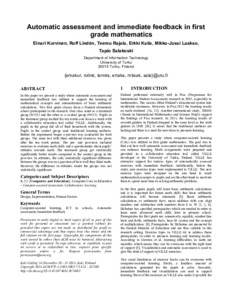Automatic assessment and immediate feedback in first grade mathematics
Einari Kurvinen; Rolf Lindén; Teemu Rajala; Erkki Kaila; Mikko-Jussi Laakso; Tapio Salakoski
https://urn.fi/URN:NBN:fi-fe2021042715301
Tiivistelmä
In this paper we present a study where automatic assessment and
immediate feedback was utilized to support the learning of
mathematical concepts and automatization of basic arithmetic
calculations. Two first grade classes from a Finnish elementary
school participated in the research. One class acted as a treatment
group (N=23) and the other as a control group (N=21). Pupils in
the treatment group worked for ten weeks one lesson a week with
a collaborative education tool called ViLLE. Additionally, the
pupils in the group did all of their homework with the system.
Pupils in the control group used traditional learning methods.
Before the experiment began a pre-test was conducted for both
groups. The same test with three additional exercises was given
after the ten week period. The pre- and post-tests included
exercises to evaluate math skills and a questionnaire about pupils’
attitudes towards math. The treatment group got statistically
significantly better results compared to the control group in the
post-test. In attitudes, the only statistically significant difference
between the groups was in a question of how well they liked math.
However, the difference in attitudes inside the groups was not
statistically significant.
Kokoelmat
- Rinnakkaistallenteet [27094]
